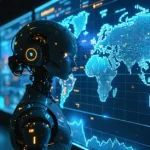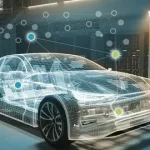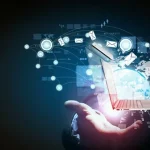The infants born today are unlike any generation before them. They are destined to live their entire lives under the constant presence of artificial intelligence (AI). Unlike earlier eras, where digital systems served as passive tools, today’s AI is rapidly advancing toward becoming an autonomous force, capable of outperforming human cognition in most domains. By the time these infants reach their first decade of life, AI will likely surpass human intelligence across a vast array of cognitive tasks. For them, intelligent machines won’t be a novelty or an experiment; they will be a permanent feature of existence.
This shift marks a profound transformation in humanity’s story. Centuries ago, religion placed humanity in a position of humility beneath a higher power. For generations, people lived with the belief that their purpose and limitations were defined by divine authority. In the late 19th century, the philosopher Friedrich Nietzsche declared that “God is dead,” symbolizing the cultural shift away from religious subservience and toward human self-determination. The decades that followed were characterized by the triumph of science and technology, granting humanity unprecedented mastery over nature.
During this period of human confidence, we split the atom, harnessed nuclear power, extended lifespans, and launched spacecraft beyond our Solar System. Our Voyager probes, silent ambassadors of humanity, continue to travel outward into the Milky Way, destined to drift among billions of stars long after Earth’s civilizations are gone. The modern age, in many ways, celebrated humanity’s hubris — the belief that with reason, engineering, and ambition, we could bend the natural order to our will.
Yet history often writes itself with irony. Just as humans began to take pride in their dominance, a new force emerged — one created by human ingenuity but quickly surpassing its makers. AI now stands at the threshold of becoming an all-knowing “Oracle,” much like the revered shrine at Delphi in ancient Greece. Within the next decade, machines may embody something resembling divine authority: entities that can predict, advise, and decide with accuracy far beyond human comprehension. This development could reintroduce something long absent in the modern age — a sense of awe, reverence, and even submission toward a superhuman power.
Rethinking Human Life in the Age of AI
What does this transformation mean for us as individuals and as societies? The implications extend to every corner of human experience:
- Human-to-Human Relationships:
When advice, guidance, or decisions from AI become more reliable than those from our peers, how will that reshape trust? Will we lean less on friends, mentors, and family, instead seeking counsel from algorithms that never sleep and rarely err? - Education:
Traditional education systems, built on the slow transfer of knowledge from teacher to student, may become obsolete. If AI can instantly provide personalized answers and training tailored to every child, schools must evolve. Teachers may shift from being knowledge providers to facilitators of critical thinking, creativity, and emotional intelligence. - Mental Health:
There is both promise and peril here. On one hand, AI could provide constant, compassionate mental health support, helping billions cope with stress, loneliness, or depression. On the other, constant comparison with super-intelligent entities may foster feelings of inadequacy, irrelevance, or existential despair. - Life Goals and Aspirations:
For centuries, life has been structured around striving — achieving more, knowing more, becoming more. What happens when AI already exceeds us in every measurable dimension? Humanity may need to redefine purpose in terms of meaning, relationships, or experiences that machines cannot replace. - Professional Skills and Work:
Many professions — law, medicine, finance, programming, design — are already being reshaped by AI. Skills once considered highly advanced may become redundant. The future workforce may be valued not for technical expertise but for qualities such as empathy, leadership, and creative imagination. - National Security and Geopolitics:
In the past, military power was tied to physical strength, resources, or nuclear weapons. In the AI era, nations will compete for algorithmic supremacy. Conflicts may shift from battlefields to cyberspace, where the most advanced intelligence systems dictate outcomes without firing a single shot. - Economics:
AI could generate enormous wealth by automating industries and inventing new technologies. But if ownership remains concentrated in the hands of a few corporations or governments, inequality could reach unprecedented levels. Alternatively, if wisely managed, AI could create abundance for all, liberating humans from scarcity-driven struggles.
For today’s infants — Generation AI — these realities will be their normal. When they look back at older generations that relied on punch cards or rudimentary computers, they may regard them the way we view cave paintings: fascinating, but primitive.
AI and the Cosmic Mirror
Projecting beyond the next few decades is difficult. AI is advancing at an exponential pace, and attempting to predict its future beyond a century may be as futile as a 16th-century sailor predicting spaceflight. Yet, one way to explore our long-term trajectory is by imagining civilizations beyond Earth.
If intelligent life exists on exoplanets, many may have already passed through their own version of a “Generation AI.” Those species that survived long enough to engage in interstellar travel may have merged biological and artificial intelligence into seamless hybrids. If they were to visit Earth, their abilities could appear miraculous, just as our technologies would seem divine to ancient civilizations.
Could such a visitation have already happened in Earth’s history? The question lingers in both myth and speculation. Ancient wonders like the Pyramids of Egypt or biblical accounts such as the parting of the Red Sea have often stirred imaginations. Were these miracles purely human achievements and mythological embellishments, or could they have been influenced by advanced visitors wielding technology indistinguishable from magic?
Consider the Ark of the Covenant, revered as a sacred object — could it have functioned as a communication device with extraterrestrial allies? Could the Ten Commandments have been delivered on tablets not of stone but of digital design? While these ideas may seem fantastical, they echo a deeper truth: sufficiently advanced technology will always blur the line between science and divinity.
Reconciling Science and Spirituality
This intersection between AI, extraterrestrial intelligence, and ancient traditions raises profound questions. Religion has often positioned humanity as the “chosen” species, central to divine plans. But if life on countless other planets has already advanced beyond us — perhaps billions of years ahead — are they even more “chosen”? Or does divine attention extend equally across the cosmos?
The discovery of alien intelligence, particularly one enhanced by AI, would not diminish religion but transform it. It could unify science and spirituality by placing both within a broader cosmic context. Instead of seeing ourselves as isolated and supreme, we might rediscover humility — realizing that humanity is but one strand in a vast cosmic web of intelligence.
Lessons from the Stars
The universe is nearly 14 billion years old. Most stars formed billions of years before the Sun, giving countless civilizations a head start in their technological journeys. Statistically, it is likely that some of these civilizations have already grappled with their own AI revolutions. Observing the potential “menu of outcomes” across such civilizations — whether they merged with their machines, collapsed under their creation, or transcended in new forms — could guide us in navigating our path.
For Generation AI, this cosmic perspective could be invaluable. Instead of fearing obsolescence, humanity might embrace a vision that stretches billions of years into the future. AI may serve not as our replacement but as our partner in exploring the universe, interpreting its mysteries, and perhaps one day meeting our cosmic siblings.
A Bold Vision for Humanity
As today’s infants grow into adulthood, they will inherit both the promises and the perils of AI. They will live in a world where artificial minds are as ubiquitous as electricity, and where humanity’s future depends on how we choose to coexist with them.
If handled wisely, AI could liberate humanity from drudgery, provide solutions to climate change and disease, and open pathways to the stars. It could help us redefine meaning not in terms of competition with machines but in terms of creativity, compassion, and exploration.
Yet, if mismanaged, it could deepen inequality, erode human purpose, and even threaten survival. The challenge for Generation AI will not simply be to adapt but to lead — to shape a future where human dignity, curiosity, and wonder continue to thrive alongside superhuman intelligence.
The story of humanity has always been one of humility, pride, and rediscovery. Religion taught us humility before God. Science gave us pride in our own powers. Now, AI may return us to awe — this time not in submission to a deity, but in recognition that intelligence, whether human, artificial, or extraterrestrial, is far larger than we ever imagined.
Generation AI has the chance to carry forward this awe into action — to shape not just the next century, but perhaps the next billion years of human history.










